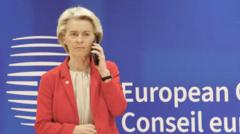The ruling highlights a growing demand for transparency in European governance, particularly during the COVID-19 pandemic vaccine negotiations.
Court Rules Against European Commission's Secrecy Over von der Leyen's Pfizer Messages

Court Rules Against European Commission's Secrecy Over von der Leyen's Pfizer Messages
EU Court declares the Commission's refusal to disclose Ursula von der Leyen's texts with Pfizer's CEO was unjustified.
The European Commission was found to be at fault for its refusal to release text messages exchanged between Ursula von der Leyen, its president, and Albert Bourla, the CEO of Pfizer, during the critical negotiations for COVID-19 vaccines. This pivotal ruling by the EU's General Court emphasized that the Commission failed to provide a credible justification for keeping these communications under wraps when a journalist sought access in 2021.
In 2021, the European Commission entered into significant contracts with Pfizer, procuring billions of euros worth of vaccines, including an agreement for an additional 1.8 billion doses. Yet, the content of the text messages between von der Leyen and Bourla continues to be shrouded in secrecy, prompting the media to dub this ongoing issue as "Pfizergate."
Anti-corruption advocates like Transparency International are celebrating the court's decision, labeling it a pivotal moment for enhancing transparency within the EU's operations. They believe this ruling could inspire a shift away from the EU's traditionally restrictive approach towards information freedom.
Ursula von der Leyen, who assumed her role at the Commission in 2019, undertook the significant responsibility of managing the EU's reaction to the COVID-19 outbreak within just a year. Following her reelection for another five-year term last year, this recent judgment poses a potential threat to her public image, particularly regarding her role in the controversial vaccine negotiations.
Following the court's ruling, the Commission indicated it would review the decision and consider its options moving forward, asserting that transparency has been a core priority throughout its mandates.
This legal tussle began when New York Times journalist Matina Stevis reported in April 2021 that von der Leyen had conducted private discussions with Bourla following the approval of Pfizer’s vaccine, sourced from its German collaborator BioNTech. The article prompted investigative journalist Alexander Fanta to file a Freedom of Information request regarding the communications between January 2021 and May 2022, which the Commission initially denied, claiming it lacked documentation.
The debate over the disclosure of these texts touches on a grey area of the Commission's transparency regulations, as records of mobile messages are not consistently classified as public documents. An EU official recently noted that such SMS exchanges are seldom archived or treated as formal records.
After finding the Commission's lack of thoroughness amounted to mismanagement, Fanta escalated the matter to the European Ombudsman, which initiated an inquiry. The situation further evolved when Fanta and the New York Times opted to challenge the Commission in court.
Wednesday's ruling indicated that the Commission's defense relied heavily on "assumptions," rather than solid evidence, as the New York Times and its journalist effectively disproved the Commission's claims. Notably, the court mandated that the Commission must provide proof that the text messages do not exist as the allegations of their deletion remained ambiguous, raising questions about potential misconduct or mishandling of information by von der Leyen.
In 2021, the European Commission entered into significant contracts with Pfizer, procuring billions of euros worth of vaccines, including an agreement for an additional 1.8 billion doses. Yet, the content of the text messages between von der Leyen and Bourla continues to be shrouded in secrecy, prompting the media to dub this ongoing issue as "Pfizergate."
Anti-corruption advocates like Transparency International are celebrating the court's decision, labeling it a pivotal moment for enhancing transparency within the EU's operations. They believe this ruling could inspire a shift away from the EU's traditionally restrictive approach towards information freedom.
Ursula von der Leyen, who assumed her role at the Commission in 2019, undertook the significant responsibility of managing the EU's reaction to the COVID-19 outbreak within just a year. Following her reelection for another five-year term last year, this recent judgment poses a potential threat to her public image, particularly regarding her role in the controversial vaccine negotiations.
Following the court's ruling, the Commission indicated it would review the decision and consider its options moving forward, asserting that transparency has been a core priority throughout its mandates.
This legal tussle began when New York Times journalist Matina Stevis reported in April 2021 that von der Leyen had conducted private discussions with Bourla following the approval of Pfizer’s vaccine, sourced from its German collaborator BioNTech. The article prompted investigative journalist Alexander Fanta to file a Freedom of Information request regarding the communications between January 2021 and May 2022, which the Commission initially denied, claiming it lacked documentation.
The debate over the disclosure of these texts touches on a grey area of the Commission's transparency regulations, as records of mobile messages are not consistently classified as public documents. An EU official recently noted that such SMS exchanges are seldom archived or treated as formal records.
After finding the Commission's lack of thoroughness amounted to mismanagement, Fanta escalated the matter to the European Ombudsman, which initiated an inquiry. The situation further evolved when Fanta and the New York Times opted to challenge the Commission in court.
Wednesday's ruling indicated that the Commission's defense relied heavily on "assumptions," rather than solid evidence, as the New York Times and its journalist effectively disproved the Commission's claims. Notably, the court mandated that the Commission must provide proof that the text messages do not exist as the allegations of their deletion remained ambiguous, raising questions about potential misconduct or mishandling of information by von der Leyen.



















